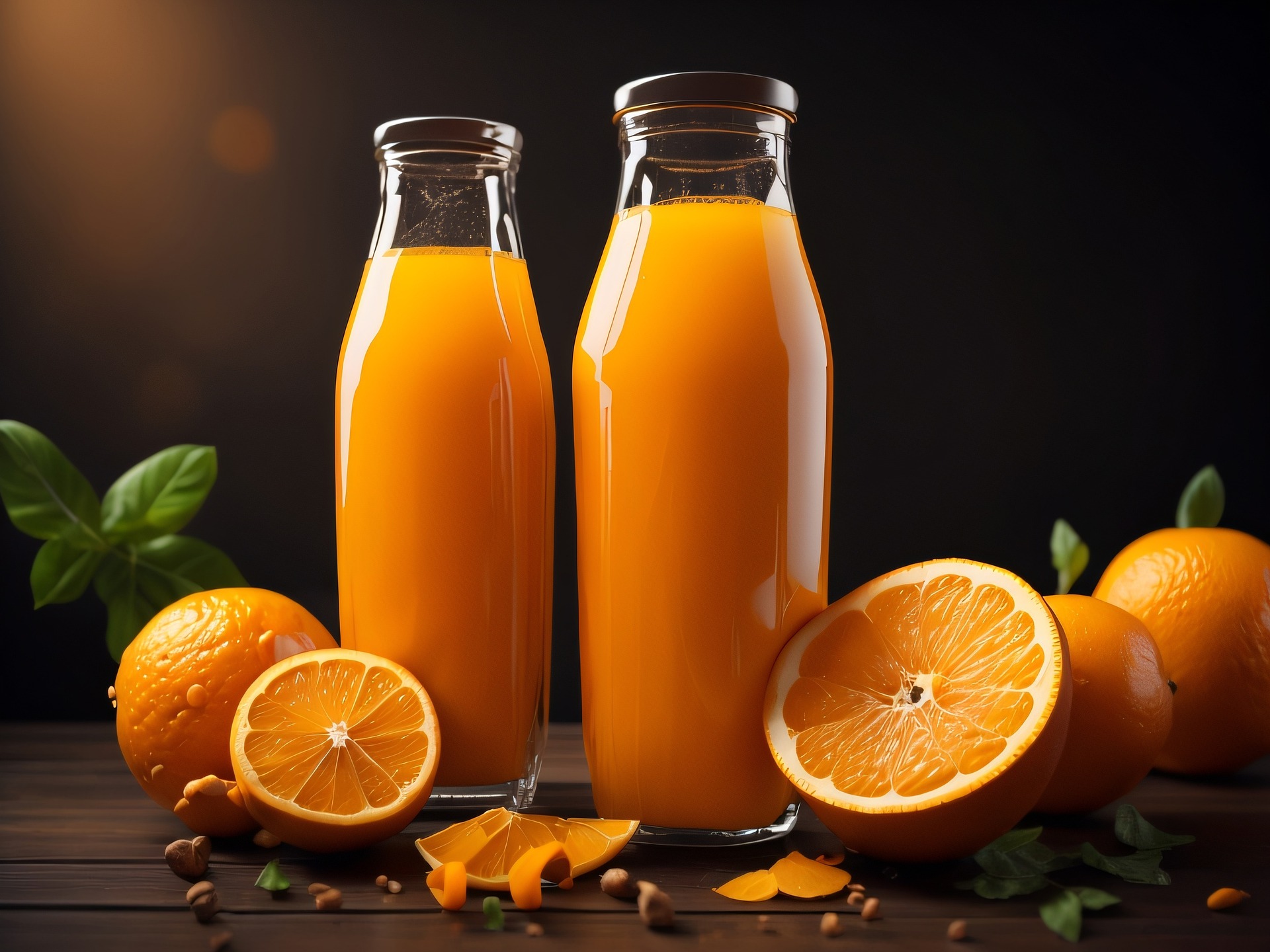 My last blog, Does Fructose Intake Increase the Risk of Cardiovascular Disease?, spurred my interest in whether or not 100% fruit juice is healthy. I knew that the juices had a lot of sugar, but I was not familiar with studies linking fruit juice to diabetes. 100% fruit juice often contains amounts of sugar similar to soda. Orange juice has 24 grams of sugar, apple juice also has 24 grams, and Pepsi has 41 grams. When removed from the fruit, the consumed fructose (sugar) in apple juice and orange juice is treated by our body the same way as the fructose found in soda.
My last blog, Does Fructose Intake Increase the Risk of Cardiovascular Disease?, spurred my interest in whether or not 100% fruit juice is healthy. I knew that the juices had a lot of sugar, but I was not familiar with studies linking fruit juice to diabetes. 100% fruit juice often contains amounts of sugar similar to soda. Orange juice has 24 grams of sugar, apple juice also has 24 grams, and Pepsi has 41 grams. When removed from the fruit, the consumed fructose (sugar) in apple juice and orange juice is treated by our body the same way as the fructose found in soda.
How fruit juice is made
Orange Juice
The way in which companies make “not from concentrate” orange juice is interesting. After squeezing the juice from the oranges, the juice is then pasteurized and placed in a storage facility for up to a year. During this time, the oxygen is removed from the juice, which also removes much of the flavor. At the end of the process, flavor packs containing additives are added to the juice. Each company uses different flavor packs, which are responsible for the different tastes of different orange juice brands. Truly fresh, squeezed orange juice has a shelf life of about twelve days.
Apple Juice
Apples are picked and then pressed. A centrifuge is used to remove the starch and pectin. The remaining liquid is then filtered to remove all solid particles. About two medium-sized McIntosh apples produce 200 mL of juice. Apple cider contains the pulp and sediment that are filtered out of apple juice.
Fruit juice raises blood glucose levels
I actually just remembered something interesting. There is a person I know with severe type II diabetes. When she has low blood sugar, she is supposed to have orange juice (fructose) to raise her blood sugar levels. Although our body only uses glucose for energy, fructose can be broken down and rebuilt into glucose through complex mechanisms, though this process can take time. Even so, orange juice is given to diabetics with low blood sugar, so it must raise our blood sugar, although it takes longer than if we just consumed a glucose tablet. Eating foods that cause spikes in blood sugar is a very important risk factor for the development of type II diabetes.
Fruit juice intake and diabetes
A large prospective study of women in the Nurse’s Healthy Study found that intake of whole fruits and vegetables was not associated with an increased risk of diabetes, while intake of fruit juices (apple, orange, and grapefruit) was associated with an increased risk of diabetes (1). Three servings of fruit a day and more than one serving of green leafy vegetables per day were associated with a decreased risk of diabetes.
Glycemic index/value of fruit juice compared to fruit
- Glycemic index – The glycemic index refers to the carbohydrate content of a food and how it affects our blood sugar. The problem with this is that it does not take into account the portion size of food usually eaten.
- Glycemic load- The glycemic load takes into account the glycemic index plus the amount of carbohydrates in the food typically eaten.
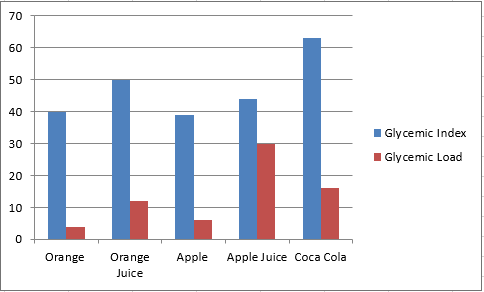
As you can see, the juices have a higher glycemic index than the fruits. I am more interested in the glycemic load, though. While the glycemic loads do not appear to differ by much, the difference is significant. A GL (glycemic load) greater than 20 is considered high; a GL of 11–19 is considered medium; and a GL of 10 or less is considered low. The glycemic loads are as follows: apple (6-low), apple juice (30-high), orange (4-low), and orange juice (12-medium). So, apple juice has a high glycemic load, and orange juice has a medium glycemic load. Consuming a high-glycemic load diet has been linked to various health problems like diabetes, cardiovascular disease, inflammation, and high total cholesterol and LDL (bad) cholesterol.
If you want to read more about glycemic load and its relationship to disease, you can read my previous blog, where I discussed the adverse health effects associated with a high glycemic load diet.
Whole apples suppress appetite more than apple sauce and apple juice
A few studies have found that consuming apple juice reduces hunger less than eating the same amount of calories in the form of a whole apple. One study measured the effects of consuming the same calorie amount of a fruit in a different form on changes in hunger (2). Subjects were given an apple with no skin, apple sauce, apple juice with fiber, and apple juice without fiber. Subjects were then allowed to eat as much food as they wanted.
Subjects who consumed whole apples ate significantly less food, compared to those consuming apple sauce and both kinds of apple juice. Adding fiber to the apple juice had no effect on satiety. Subjects rated apple slices as the most filling, followed by apple sauce and both types of apple juice. While whole fruit has been shown to reduce appetite more than fruit juice, one cannot discount the possibility that expectations about how filling a food is influence how full the subjects become. While I believe that this affected the findings of the study, I also believe that whole apples cause physiological responses in our body that tell the brain we are eating calories, while juice does not have this effect.
Why juices do not decrease hunger
There are a few reasons why juices do not decrease hunger as much as whole foods. The act of chewing food may provide an internal satiety signal not activated when liquids are swallowed (3). It may also be because liquids have a lot less volume than solid foods and may not trigger receptors in the stomach, which are influenced by the volume of food. These are a few ideas, but satiety is much more complicated than that. There are dozens of hormones associated with hunger and satiety that are released in the GI tract. Fullness and satiety are likely regulated by a combination of hormones, which we do not fully understand. If you really want to know more about beverages inducing less satiety than solid foods, you can read my blog talking about the satiety of beverages.
Fruit juice intake and weight gain
As fruit juice does not suppress our appetite very much, it would make sense that adding fruit juice to the diet has the potential to result in excessive caloric intake and weight gain. One cup of orange juice contains about 120 calories. One cup a day likely would not lead to weight gain, but more than one cup of juice a day can add up. For people who are already overweight, drinking 100% fruit juice may make it difficult to lose weight. These people are better off eating something more filling instead of drinking juice.
Phytochemicals and antioxidants in whole fruit
- Antioxidants- substances that may prevent or delay types of cell damage. Found in fruits, vegetables and dietary supplements.
- Phytochemicals-plant chemicals which are responsible for the plant color. Have anticancer and antioxidant activities.
- Flavonoids- type of phytochemical found only in plants. They are antioxidants that may work against cancer cells and viruses, in addition to reducing inflammation and allergic reactions.
To my surprise, fruits and fruit juices contain similar amounts of antioxidants. They do, however, contain different amounts of phytochemicals. The flavonoid content in whole oranges is eight times higher than that in homogenized oranges (4). Many of the oranges’ flavonoids are in the orange peel and the white membrane holding the orange slices together. This is part of the reason there is a significant decline in flavonoids in orange juice compared to the whole fruit.
Another problem with orange juice is that the flavonoids precipitate and go into the cloudy portion of the juice, where they can no longer be absorbed by our body. One study, which stored orange juice in the fridge for four days, found that 50% of the flavonoids precipitate and go into the cloud portion of the juice. Industrial processing of the juice also causes flavonoids to go into the cloud portion. (5).
Apple Juice
Processing apples into apple juice results in a significant decrease in phytochemical content (6). When Jonagold apples were pulped and straight-pressed, they retained only 10% of the antioxidant activity compared to the whole apple. When the juice was subjected to pulp enzyming, it only retained 3% of the antioxidant activity compared to the whole apple. Another study found that apple juice only had 42% of the total antioxidants compared to the whole apple. Most of the antioxidant activity of an apple is found in the skin, which is removed when making apple juice and applesauce. The apple peel contains between 1.5 and 9.2 times greater total antioxidant activity compared to the flesh (7).
Below is a chart comparing two common orange flavonoids in different orange types
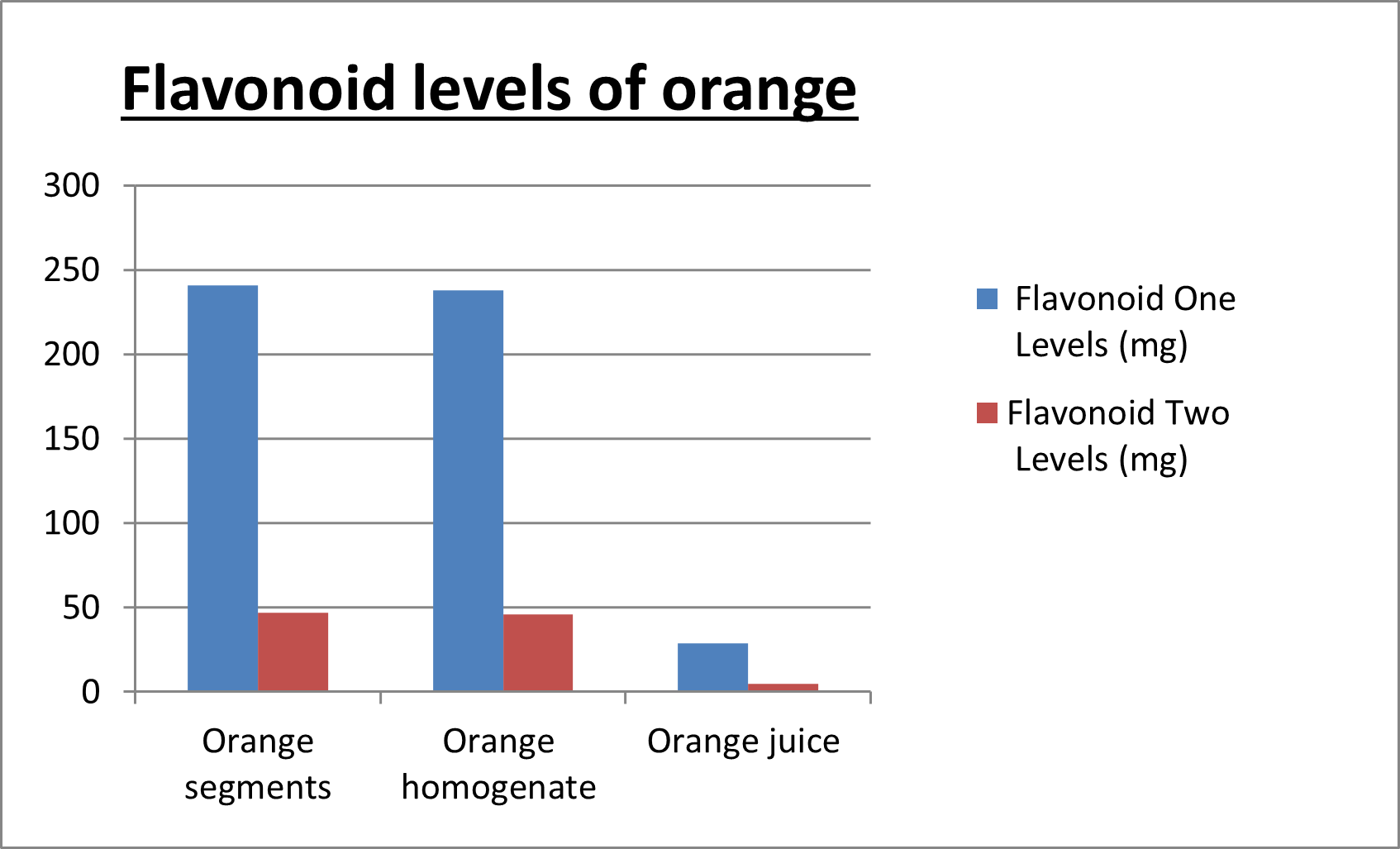
Fruit juice should not count as a serving of fruit
Fruit juice is essentially empty calories. Yes, it has some vitamins, minerals, and phytochemicals. But it also has a ton of sugar. Would you count a multivitamin as a serving of fruit? No. You have to consume the whole fruit to get all of the benefits. If we took all of the vitamins, minerals, and phytochemicals from 100% juice and made it into a pill, people would most likely agree that this is not the same as eating the whole fruit. There are a lot of other chemicals in whole fruit that we do not know about. We believe that fiber is the main reason whole fruit does not cause a spike in blood sugar. But believe it or not, there could be hundreds of chemicals in a piece of fruit that we have yet to discover. We only know what we can measure. You are honestly better off taking a vitamin or mineral supplement and water than drinking 100% juice.
Discussion
My main issues with fruit juice are the possible weight gain and the increased risk of diabetes. Comparing the diets of fruit juice drinkers and non-fruit juice drinkers is not that valuable, since fruit juice drinkers have been found to consume healthier diets than non-fruit juice drinkers. We have to look at the science. Fruit juice and soda have similar amounts of sugar. Fruit juice has a higher glycemic index and glycemic load than whole fruit. Fruit juice causes a spike in our blood sugar. These are the reasons that fruit juice can contribute to diabetes. A few vitamins will not offset these problems. Fruit juice is also not filling and can cause weight gain, which further increases the risk of developing diabetes.
Sources
- Bazzano, L. A., Li, T. Y., Joshipura, K. J., & Hu, F. B. (2008). Intake of fruit, vegetables, and fruit juices and risk of diabetes in women. Diabetes care.
- Flood-Obbagy, J. E., & Rolls, B. J. (2009). The effect of fruit in different forms on energy intake and satiety at a meal. Appetite, 52(2), 416-422.
- DiMeglio, D. P., & Mattes, R. D. (2000). Liquid versus solid carbohydrate: effects on food intake and body weight. International journal of obesity, 24(6), 794-800.
- Aschoff, J. K., Kaufmann, S., Kalkan, O., Neidhart, S., Carle, R., & Schweiggert, R. M. (2015). In Vitro Bioaccessibility of Carotenoids, Flavonoids, and Vitamin C from Differently Processed Oranges and Orange Juices [Citrus sinensis (L.) Osbeck]. Journal of agricultural and food chemistry, 63(2), 578-587.
- Gil-Izquierdo, A., Gil, M. I., Ferreres, F., & Tomás-Barberán, F. A. (2001). In vitro availability of flavonoids and other phenolics in orange juice. Journal of Agricultural and Food Chemistry, 49(2), 1035-1041.
- Boyer, J., & Liu, R. H. (2004). Apple phytochemicals and their health benefits. Nutr J, 3(5), 12.
- Drogoudi, P. D., Michailidis, Z., & Pantelidis, G. (2008). Peel and flesh antioxidant content and harvest quality characteristics of seven apple cultivars. Scientia Horticulturae, 115(2), 149-153.

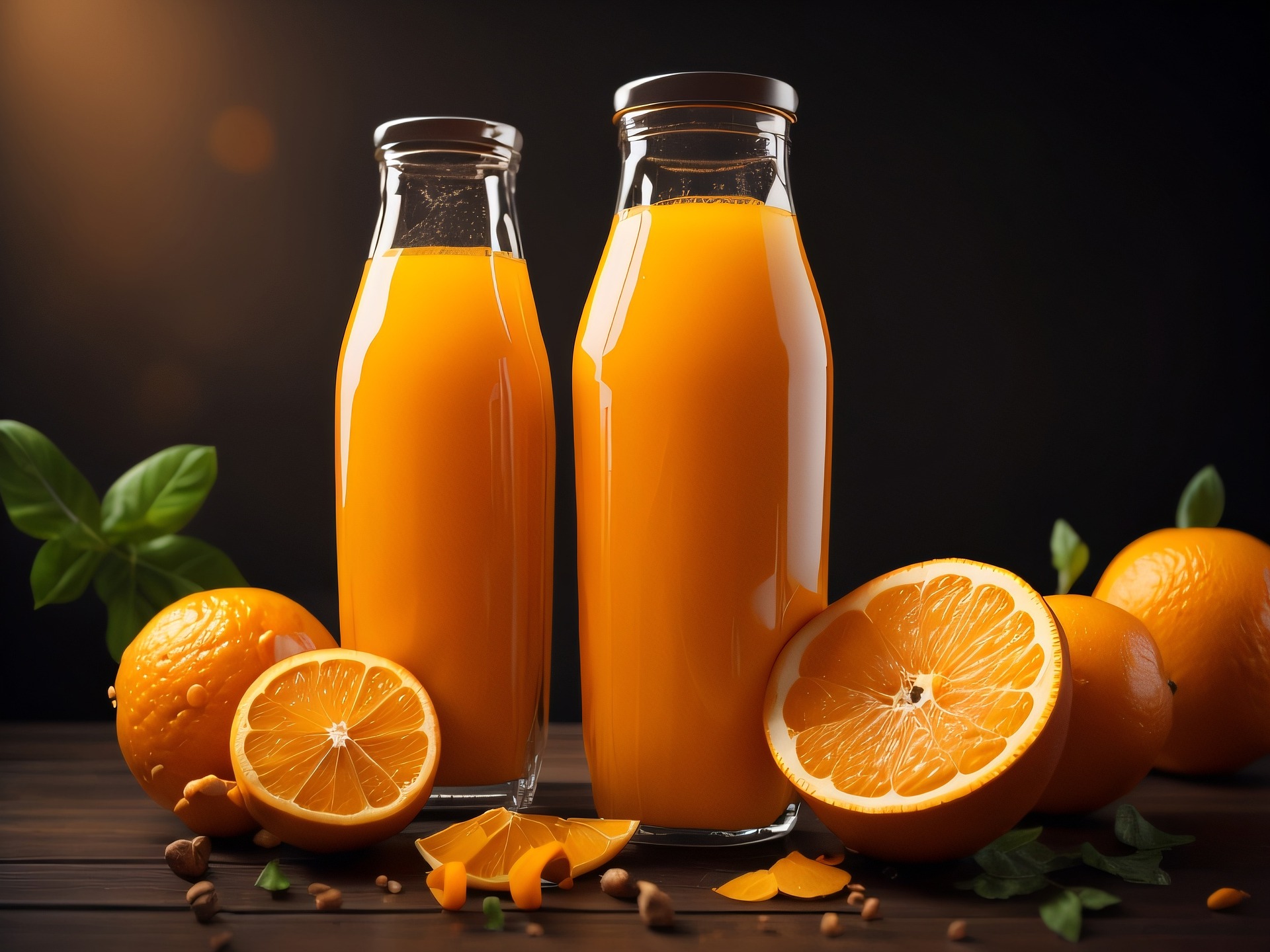
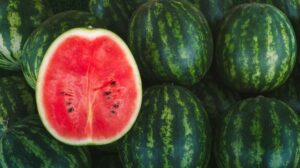

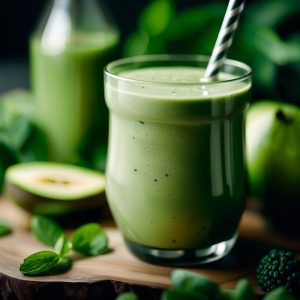
I guess the simple answer is “just drink water”……..but it’s so hard !! Nice post!
Hey Bernal. I agree, drinking water can become boring. You can always drink calorie free beverages in addition to water. But having juice a few times a week probably won’t hurt you in the long run. But drinking it daily, or drinking a few cups a day, can cause health problems over time. You could also try seltzer water or flavored water. Or add lemon, lime or mint to your water.
I mainly drink water (spring/distilled water – Spring if it is my choice). Once in a while I crave juice or soda, but I will consider all the choices you gave Bernal instead.